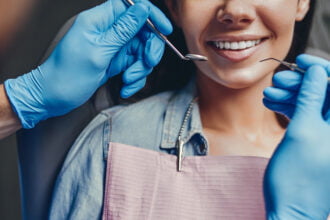Regulate your rosacea? This is a dream for many people who experience uncomfortable and swollen redness. Dermatologists have some great skin care tips that can help.
The skin condition typically returns in waves. There are various stages to it. Therein lays your opportunity to lessen rosacea. You may learn how to spot and calm fresh rosacea flare-ups and what to do about them here.
What is rosacea?
Rosacea symptoms include red skin, nodules, heat buildup, or stabbing pain (sometimes also spelled rosacea). It is a connective tissue-affected inflammatory skin condition. The face is the primary affected area. On the neck and décolleté, the so-called efflorescences are extremely uncommon.
Up to 20% of the population may have this common skin problem.
What distinguishes rosacea from couperose?
Although the two terms are frequently used interchangeably, couperose refers to the mildest form of rosacea. While it is permanent in rosacea, the redness at this stage comes and goes in spurts.
Rosacea primarily affects those with fair skin
With skin type 1, or very pale skin and blond or red hair, it happens the most commonly. It was formerly referred to as the “curse of the Celts” because of this. She attacks in this manner. Many men and women in their 30s are unexpectedly struck by this dermatosis. Therefore, it can be challenging to take preventative action in a timely manner, particularly when rosacea first manifests. You can spot the disease’s various phases as it develops early on. Of course, you need to be aware of your surroundings.
Rosacea comes and goes
I’ll start by saying that’s good news. The red skin flowers are not necessarily a permanent part of you once you discover them on yourself. It will improve! The challenging aspect is that this dermatosis resembles other skin conditions. It is frequently handled incorrectly or too late. You’ll understand why soon.
The preliminary stage of rosacea
Your skin suddenly turns red for no apparent reason. In the initial stage, this redness is most noticeable on the cheeks, nose, chin, and center of the forehead. The triggers include frequently spicy food, hot drinks, alcohol, or stress.
- ● Rosacea Grade-1 (couperose)
The first skin reddening goes away quite quickly, but as time goes on, it gets longer and longer. That resembles a sunburn, which is something that this skin type is also prone to. The only addition is vascular dilations. Under the skin, tiny veins can be seen. The inflammatory process causes the connective tissue to weaken, which is the cause. On occasion, the affected area stings, burns, or itches. Dryness is a symptom of rosacea.
- ● Rosacea Grade – 2
Now that the inflammation has surfaced, it is very obvious. On the skin, nodules and bubbles appear. Additionally common is lymphedema. On the face, where there is a lot of lymph flowing, they appear as swellings.
- ● Rosacea Grade – 3
The swelling becomes more obvious as the inflammation progresses. The sebaceous glands and connective tissue enlarge. On the nose, bulging growths can occasionally be seen. This has a particular impact on men. And don’t worry; only a small number of people will find it that bad.
Rosacea flare-ups
Although certain people are presumably more prone to acquiring rosacea than others, the disease’s true origin is yet unknown. This does not imply, however, that one is ignorant of the relapse-causing factors. Some well-known elements contribute to rosacea outbreaks. They frequently play together in groups.
These include the traditional suspects in skin diseases: ultraviolet radiation, stress, nutrition, alcohol, body toxins, environmental factors like pollen counts or exhaust fumes, as well as cosmetics and medications. Understanding your particular flare-up causes is crucial to long-term disease management. The FIVE ethos is that knowledge equals power. A diary is helpful for that.
Treat Rosacea
- See a dermatologist right away.
There are many important reasons to see dermatologists. You can stop the sickness from spreading in this way. Although I truly don’t advise it for any skin condition, a correct rosacea diagnosis is crucial. Additionally, mites or anaerobic microorganisms frequently stress the skin, and you can only get rid of them with the right therapy.
- Consult with a second or third person
We frequently receive emails from desperate people who are unhappy with the dermatologists’ recommended treatment. Many people claim that after taking the medicine, their rosacea got worse. It is common knowledge that the diagnosis of rosacea is not always certain. Because the symptoms frequently resemble acne, dermatologists can have trouble diagnosing it. So, if you’re not sure about something, get a second opinion.
- Be involved and knowledgeable.
If you don’t participate, treatment won’t work very effectively. This is crucial for conditions of the skin. Take care of your illness on your own – keyword journal. And stay away from anything you think might be a trigger. In addition to active stress reduction, an anti-inflammatory diet is beneficial.
Treatment for rosacea
Even the greatest skin care cannot take the place of medical treatment for this dermatosis. It may, however, both support and prevent. Because every skin type responds slightly differently, it can be challenging to find the best rosacea treatment. In Australia, due to the amount of sun the average person gets, they have specialized treatments such as the rosacea laser treatment in Melbourne. Only you know how you respond to particular substances. Itching or burning discomfort is a sign that the product should be avoided.
What to look out for with rosacea
- Everything that irritates should be avoided when inflammation is present. This comprises a variety of additives that must be added to water-based treatments, as well as facial tonics containing alcohol and strong cleaning agents.
- Rich creams, especially traditional treatments with mineral oils, are useless to you even if your skin seems dry. They remain on the skin because they are occlusive. This will make the issue worse by allowing more heat to accumulate in your inflamed skin.
- Less can be more. Rosacea calls for the judicious use of products and even water. It should never be heated, at most lukewarm. Even ordinary water could cause a reaction on your skin. Then you can wash your face with distilled water.
- Avoid doing anything that stimulates facial blood flow. So avoid touching peelings, whether they are done mechanically or with fruit acids. Ingredients that promote blood circulation are also present. Additionally, stay away from menthol, rosemary, perfumes, and caffeine.
- Go bare: Avoid wearing any makeup if at all feasible. Mineral oils and silicones, which are typically contained in traditional foundations, provide an additional occlusive effect. Naturally, it makes sense if you’d prefer to hide the redness. Mineral makeup is the way to go if you absolutely can’t live without it.
- Avoid highly complex products or ones that have a lot of ingredients. In conventional cosmetics, there are frequently at least 30 parts. Your skin may always use a little extra hydration or irritation. Emulsifiers, for instance. You might think about abandoning the idea of “cream” altogether because these are primarily present in creams.
- Always use sun protection. Select an SPF that is adequate for your fair skin type. Chemical filters are not as effective as sunscreen with mineral UV filters. The latter transforms light into heat, and your skin is already overheated from that.
Natural treatments
Always discuss any changes to your skin with your doctor. While skin changes in rosacea may be a sign of a more serious underlying problem that requires medical attention, the condition is often very innocuous.
You have alternatives if rosacea is identified as your condition without more significant underlying causes. If your case of rosacea isn’t too severe, you might want to try some of the following natural ways to treat skin problems before turning to prescription medicine.
- ● Aloe vera
The emollient and hydrating aloe vera plant’s interior leaf gel. It works well as a topical treatment for rosacea. Aloe is a common ingredient in lotions. Use them and adhere to the instructions on the packaging. Alternately, take a leaf from a living aloe plant and apply the inside gel to your skin. Before using aloe vera on bigger regions, conduct a patch test to rule out allergies or sensitivity.
- ● Coconut Oil
Coconut oil moisturizers are popular for treating rosacea and other inflammatory skin disorders.
Recent research on coconut oil’s ability to treat rosacea is lacking. But as a well-known anti-inflammatory, antioxidant, and moisturizer, it might still be helpful. To your skin, apply a small amount of premium coconut oil. If desired, you can also use it as a carrier oil for suitable essential oils.
- ● Green tea
Green tea is available as a beverage and herbal supplement and is extremely high in antioxidants. It can be helpful in the treatment of rosacea, according to research.
For inflammation, including skin disorders, antioxidants are beneficial. As a result, green tea may be a well-liked component of skin care items and rosacea creams. The most effective way to treat rosacea is by using topical medicines along with green tea. You may also use cooled green tea as a compress in addition to drinking it for its many health advantages.
- ● Lavender essential oil
To treat rosacea, many essential oils may be applied topically. Lavender is the most researched and accessible of all of these. Apply lavender essential oil to your skin after diluting it in carrier oil. or incorporate a few drops into your preferred moisturizer. Per ounce of product, use five drops.
- ● Oatmeal
A traditional home treatment for rosacea is oatmeal. It is believed to fortify skin and lessen water loss, which can make the problem worse. Oatmeal may lessen irritation as well. Oatmeal is an ingredient in certain skin care treatments, such as face masks; these are excellent choices. Another option is to combine a few tablespoons of oats with water and apply it topically.
- ● Raw honey
Some varieties of honey, particularly raw honey, may be efficient and simple rosacea remedies. This may be so because dryness makes rosacea symptoms worse and honey helps skin maintain moisture. A form of honey known as kanuka honey was demonstrated to be extremely beneficial against rosacea in a 2015 study. Purchase premium raw honey. It’s advised to use manuka or kanuka honey. Put a little bit of it immediately on your skin.
- ● Turmeric
A well-known natural anti-inflammatory is a turmeric. It could be suggested for uncomfortable and swollen rosacea symptoms. For its many health advantages, you can also eat the herb or cook with it.
Apply some diluted turmeric essential oil in carrier oil. Turmeric is a component of some creams and lotions. You can also make a poultice by combining turmeric powder and water.
Conclusion: Rosacea requires medical attention
It’s crucial to note this aspect. Good, non-irritating treatment is beneficial but ineffective on its own. So, seek out a dermatologist’s office you can trust and put in some effort, perhaps by maintaining a journal. So that you can avoid them, you learn what your triggers are. As most of what we consume encourages inflammation, attempt to switch to an anti-inflammatory diet. and lessen your tension. You have a decent possibility of controlling your skin disorders thanks to this.








